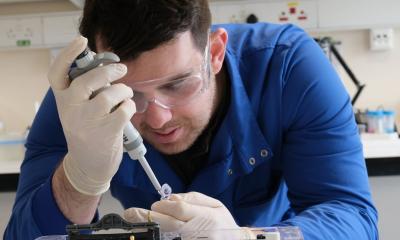Image source: Unsplash/Mélissa Jeanty
News • Cultural differences matter
Study shows: Hand washing is key against COVID-19
Countries where people do not have a habit of washing their hands automatically tend to have a much higher exposure to coronavirus, a new study reveals.
University of Birmingham researchers have discovered that at least 50% of people do not have a habit of automatic handwashing after using the toilet in China (77%), Japan (70%), South Korea (61%) and the Netherlands (50%). These countries are followed by Thailand and Kenya, where 48% do not have this habit, and Italy with 43%. In contrast, UK and US frequencies are 25% and 23%, correspondingly. The best handwashing culture is observed in Saudi Arabia, where only 3% of people do not wash their hands habitually.
Professor Ganna Pogrebna, from Birmingham Business School and Dr. Alex Kharlamov, from Birmingham Law School, published their findings in Regulation & Governance.

Image source: National Cancer Institute (NCI)
Professor Pogrebna commented: “Countries where people do not have a habit of washing their hands automatically tend to have a much higher exposure to COVID-19. In the absence of a cure or vaccine, the current outbreak obliges humanity to find ways of reducing the potential risk of infection. Frequent handwashing with soap for at least 20 seconds is widely advised as a preventive measure against COVID-19. It is possible to quickly influence individual hygiene behaviour in the short term, but changing handwashing culture in a particular country – or globally – is a much more difficult task.”
In 2015, the BVA France Sarl, Worldwide Independent Network of Market Research and GALLUP International published data on human handwashing habits from 63 countries around the globe by asking people to agree or disagree with the following statement “Washing your hands with soap after using a toilet is something you do automatically."
Professor Pogrebna and Dr. Kharlamov used the dataset of 64,002 respondents as a proxy of handwashing culture to explore the impact of this culture on the COVID-19 outbreak magnitude. Dr. Alex Kharlamov commented: “Many factors may have contributed to the spread of COVID-19 around the globe, but handwashing culture alone appears to be an important factor in explaining why some counties have been hit harder by the outbreak. Time will tell whether the challenges posed by COVID-19 will help to make handwashing culture around the globe more unified. However, the data – adjusted for cultural differences and differences in economic development between countries – demonstrated a very strong correlation between lack of handwashing culture and exposure to the virus.”
Source: University of Birmingham
25.03.2020











